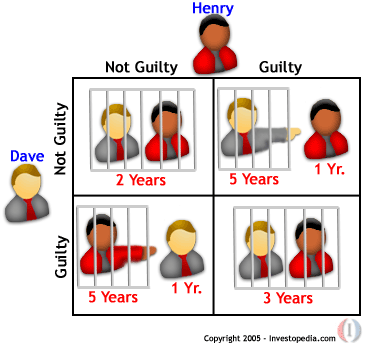Prisoner's Dilemma
A paradox in decision analysis in which two individuals acting in their own best interest pursue a course of action that does not result in the ideal outcome. The typical prisoner’s dilemma is set up in such a way that both parties choose to protect themselves at the expense of the other participant. As a result of following a purely logical thought process to help oneself, both participants find themselves in a worse state than if they had cooperated with each other in the decision-making process.
Suppose two friends, Dave and Henry, are suspected of committing a crime and are being interrogated in separate rooms. Both individuals want to minimize their jail sentence. Both of them face the same scenario:

Dave has the option of pleading guilty or not guilty. If he pleads not guilty, Henry can plead not guilty and get a two-year sentence, or he can plead guilty and get a one-year sentence. It is in Henry’s best interest to plead guilty if Dave pleads not guilty. If Dave pleads guilty, Henry can plead not guilty and receive a five-year sentence. Otherwise he can plead guilty and get a three-year sentence. It is in Henry’s best interest to plead guilty if Dave pleads guilty.
Suppose two friends, Dave and Henry, are suspected of committing a crime and are being interrogated in separate rooms. Both individuals want to minimize their jail sentence. Both of them face the same scenario:

Dave has the option of pleading guilty or not guilty. If he pleads not guilty, Henry can plead not guilty and get a two-year sentence, or he can plead guilty and get a one-year sentence. It is in Henry’s best interest to plead guilty if Dave pleads not guilty. If Dave pleads guilty, Henry can plead not guilty and receive a five-year sentence. Otherwise he can plead guilty and get a three-year sentence. It is in Henry’s best interest to plead guilty if Dave pleads guilty.
Dave faces the same decision matrix and follows the same logic as Henry. As a result, both parties plead guilty and spend three years in jail although through cooperation they could have served only two.
A true prisoner’s dilemma is typically "played" only once; otherwise it is classified as an iterated prisoner’s dilemma.
热门专栏
热门词条
应收账款
区域货币
区间估计
金融危机
资本成本
CPI(Consumer Price Index)
汇率
资产
经济
美元
单向定单
租赁期
外汇通
服务
外汇佣金
SME
ISO
认可
增量成本
什一税
CFO
MIT
加工
销售
MG金融集团
股价反弹
抽签偿还
股利收入
技术
空头陷阱
资本
REF
市场
中国股市
中小企业
备付金率
美国
两会
价格
吊空
指数
股灾
葡萄牙币
调至市价
pt
清算
电子汇兑
税粮
下降三角形
外汇
FDI
Writer
银行
投资
管理
阴烛
MACD
width
冲账
Theta
短期同业拆借
货币
peg
外汇交易法
金融中介理论
企业
艾略特波段理论的含义
消费发展战略
黄金
巴塞尔资本协议
贴现现金流
联系汇率制度
拔档
美国贝勒大学
产品
汇差清算率
延期付款汇票
短期国际商业贷款
计期汇票
Exposure
集中竞价
金融
标准普尔(S&P)
不完全竞争市场理论 (金融)
公司
正利差
分期付款汇票
软通货
出口物价指数
选择权买方
资金
百分比回撤
无记名汇票最低报价戴维·凯特标准·普尔 500指数抵押品持平德国工业产值德国消费者物价指数成本协同效益
股票
非农就业人口
交易
道琼斯公用事业平均指数
持平
指示汇票
产品竞争力
财务指标 盈利能力比率
德国伊弗研究所景气调查
外汇实盘交易方式
外汇实盘交易指令
国际收支差额
